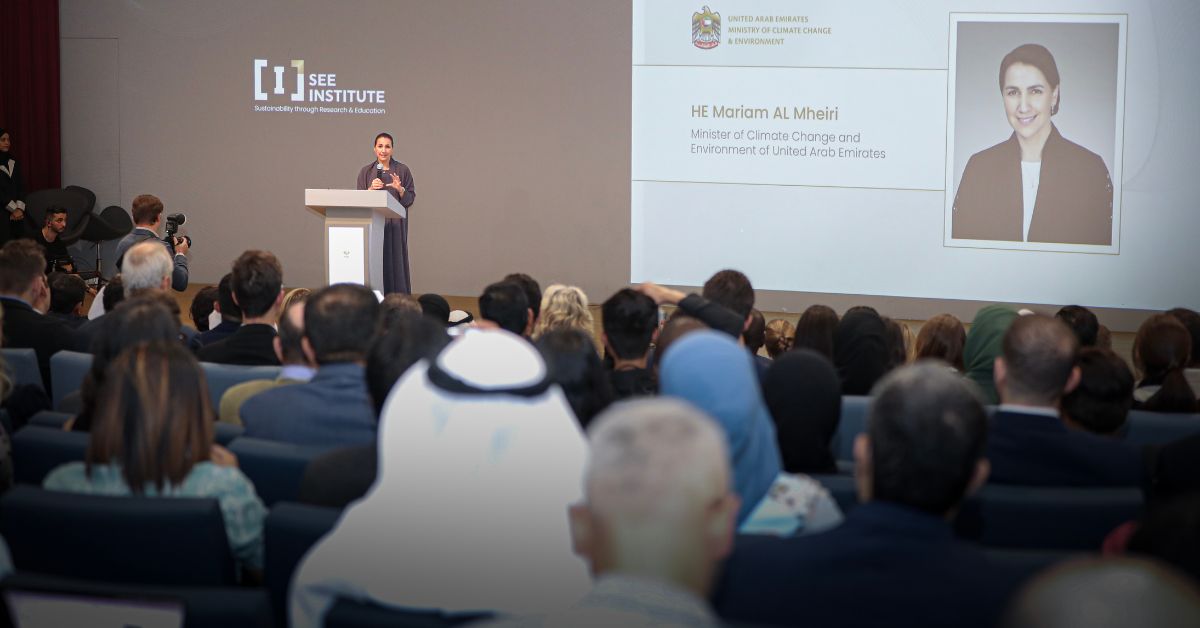DUBAI – UAE businesses should integrate sustainability into all their operations. This approach not only unlocks inclusive climate solutions but also supports the nation’s goal of becoming Net Zero by 2050, said Mariam bint Mohammed Almheiri, UAE Minister of Climate Change and Environment.
Almheiri was speaking at the 12th National Dialogue for Climate Ambition (NDCA), a monthly stakeholder forum organized by the Ministry. This forum aims to elevate sector climate ambition and promote comprehensive participation.
The recent session, themed ‘Innovative Financing through National Carbon Registry,’ took place at the SEE Institute in The Sustainable City, Dubai. Olav Myklebust, Ambassador of Norway to the UAE, and approximately 260 representatives from government and business entities attended the event.
“As the UAE gears up to host COP28, aiming for the most inclusive and solution-driven summit, it’s crucial to involve all partners in hastening climate action, both locally and globally. Our objective is to mainstream sustainability. We’re convinced that if we can make intricate climate change issues relatable worldwide, we can undoubtedly fulfill the Paris Agreement’s objectives,” said Almheiri.
“By ‘mainstreaming sustainability,’ we open a realm of solutions. I’m confident that the innovative and ambitious business community present today, and throughout the UAE, holds the solution,” she added.
She encouraged all businesses to commit to the UAE Climate Responsible Companies Pledge, an initiative by the Ministry to amplify the UAE’s climate action and aim for higher greenhouse gas emission reduction targets.
In response, 12 companies, including Etihad Water & Electricity, Dubai Islamic Bank, and MUBADALA, among others, committed to the pledge. This brings the total number of pledging companies to 117.
“Companies that have pledged are dedicated to intensifying collective efforts against climate change, transparently measuring and reporting greenhouse gas emissions, devising emission reduction solutions, and sharing their strategies with the government to reach our Net Zero objectives,” said Almheiri.
Highlighting the significance of carbon registries, Almheiri described them as the unsung heroes of decarbonization. “These platforms enable organizations to track, manage, and trade greenhouse gas emissions. They’re vital as they offer a method for companies and governments to measure, report, and verify emission reductions, fulfilling our ambitious commitments,” she said.
Almheiri also stressed the need to speed up climate finance for projects targeting negative emissions and neutralizing residual emissions. “Climate finance is pivotal for climate action. We must bolster efforts to expedite it, a primary goal for the UAE at COP28. The climate crisis is reshaping our lifestyles and work. However, climate change and the transition to a net-zero future can foster new industries and growth opportunities for businesses,” she said.
The 12th NDCA delved into the Carbon Registry’s implementation, offering insights into its role in registering and distributing carbon credit in the country. Experts spotlighted the registry’s aim to list, transfer, and track carbon credits produced by projects and businesses. They also discussed the global influence of carbon registries in enabling carbon credit transfers across borders, fostering international collaboration in curbing greenhouse gas emissions.
During the event, the Ministry of Climate Change and Environment underscored the carbon registries’ importance. A panel discussion on the topic featured regulators, industry participants, auditors, and registries. Alongside a comprehensive presentation on decarbonization strategies, breakout sessions explored topics like technology for voluntary carbon markets, greenhouse gas emissions cap and trade, and the carbon registry’s role in prioritizing hard-to-abate sectors.

